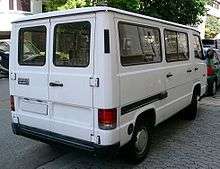Mercedes-Benz MB100
| Mercedes-Benz MB100 | |
|---|---|
 | |
| Overview | |
| Manufacturer | Mercedes-Benz |
| Also called |
SsangYong Istana Daewoo Istana |
| Production | 1981 - 1996 |
| Body and chassis | |
| Class | Light commercial vehicle (M) |
| Body style | Passenger van, panel van |
| Layout | FWD |
| Powertrain | |
| Engine |
2.2 L DOHC I4 petrol 2.3 L DOHC I4 petrol 2.4 L OHC I4 diesel 2.9 L OHC I5 diesel |
| Transmission | 5-speed manual |
| Dimensions | |
| Wheelbase |
2,455 mm (96.7 in) (MB100) 2,680 mm (105.5 in) (MB140) |
| Length |
4,890 mm (192.5 in) (MB100) 5,340 mm (210.2 in) (MB140) |
| Width | 1,855 mm (73.0 in) |
| Height | 2,000 mm (78.7 in) |
| Kerb weight |
1,710 kg (3,769.9 lb) (MB100) 1,725 kg (3,803.0 lb) (MB100D) |
| Chronology | |
| Predecessor | Mercedes-Benz N1000 |
| Successor | Mercedes-Benz Vito |
The Mercedes-Benz MB100 (Model type 631) is a van made by Mercedes-Benz España S.A. from 1981 to 1996 at their Vitoria-Gasteiz factory in northern Spain. It was offered as a cargo van, a passenger van, and a pickup truck.[1]
Mercedes-Benz España S.A. had obtained the Vitoria factory from Industrias del Motor S.A. (IMOSA) which had been making their F1000 L van there. The F1000 L was a development of the DKW Schnellaster, but with a Mercedes-Benz diesel engine instead of the original DKW two-stroke petrol engine. The MB100 was a further development of IMOSA's F1000 L van.[2]
The MB100 was powered by a 2.4 litre diesel making about 55 kW (73 hp), an engine also used in the Mercedes Benz 207D.
The MB100 was offered in Germany from 1987 to 1995 as an extension of Daimler-Benz's commercial motor vehicle range.[1] In 1992 the MB100 was given a slanted radiator and an extended front end, intended among other things to enhance safety in a collision.
The MB100 was replaced by the Mercedes-Benz Vito in 1996, but remained available for export markets such as Brazil and Argentina until 1997 when the Sprinter started to be made in Argentina.[3]
Pacific market MB100 and MB140

In 1999, DaimlerChrysler Australia/Pacific introduced the MB100 and the MB140 (Model type 661), a larger derivative of the MB100, to the Australian and Pacific markets.[4] These vans were manufactured under licence by the SsangYong Motor Company, which also made a re-badged version called the SsangYong Istana. The Pacific market MB100D and MB140D both used a licensed version of the naturally aspirated 2.9L OM602 I5 motor from Mercedes mated to a 5 speed manual transmission while the MB100 and MB140 used a licensed Mercedes M111 2.3L petrol engine mated to a 5 speed as well. There were both van and mini bus versions with the bus versions having sliding windows, rear concealed air conditioning in the ceiling and convenience lights for the comfort of passengers. In some markets, for example Singapore, there was also an electric step which would slide out when the sliding door was opened for the convenience of passengers. They were made in both right and left hand drive depending on the market it was in and depending on seat arrangement, could accommodate up to 15 people. In late 2004, Shanghai Huizhong Automotive Manufacturing Co., Ltd. took over a major stake in Ssangyong's automobiles division and started manufacturing a redesigned version of the Pacific market MB140.


Notes
References
- "AutoWeb: Mercedes Unveils A New Vision In Vans". Australia: Web Publications Pty. 1999-11-26. Retrieved 2010-10-14.
- "Mercedes-Benz Classic - Vans - 1955-1993 - 1987: The Mercedes-Benz MB 100". Retrieved 2010-10-14.
- "Mercedes-Benz Classic - Vans - 1994-2005 - 1996: The Mercedes-Benz Vito". Retrieved 2010-10-14.
- "Mercedes-Benz MB100 Panel Van Specifications" (PDF). Mulgrave, Victoria, Australia: DaimlerChrysler Australia/Pacific Pty. Retrieved 2010-10-14.
External links
| Wikimedia Commons has media related to Mercedes-Benz MB 100. |